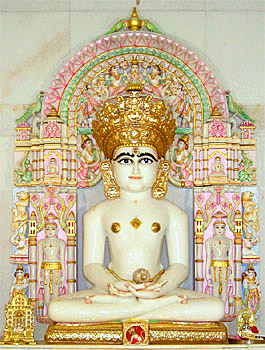 Jainism believes in God not as a creator but as a perfect being. According to the Jaina-doctrine the world is eternal and ephemeral. It listens only to its own laws and remains unchanged in its basic nature although its parts change. No God has created it, rules it and can destroy it. Jains deny the existence of an imperishable, all-mighty highest "Lord" (Ishwara) who creates the universe, rules it, and when he likes, destroys it.
Jainism believes in God not as a creator but as a perfect being. According to the Jaina-doctrine the world is eternal and ephemeral. It listens only to its own laws and remains unchanged in its basic nature although its parts change. No God has created it, rules it and can destroy it. Jains deny the existence of an imperishable, all-mighty highest "Lord" (Ishwara) who creates the universe, rules it, and when he likes, destroys it.
Concept of God in Jainism
When a person destroys all his karmas, then he becomes a liberated soul. He resides in a perfect blissful state in Moksha possessing infinite knowledge, infinite vision, infinite power and infinite bliss. This living being is a "God" according to the Jainism. Every living being has a potential to become God. For this reason, Jains do not have one God; rather there are innumerable and their number is continuously increasing as more living beings attain liberation. Jains believe that from the very beginning of the time every living is associated with karmas. The main purpose of the religion is to remove these karmas which are attached to the soul and become liberated soul.
Types of Karmas to Attain Moksha
There are several types of karmas, which help to attain moksha to be a perfect being, which is equivalent to being a God. The karmas are:
Mohniya Karma: It generates delusion in the soul to bring out the true nature of the person and makes it identify itself with other external substances.
Jnana-Varaniya Karma: It covers the soul`s power of perfect knowledge.
Darasna-Varaniya Karma: It covers the soul`s power of perfect visions.
Antaraya Karma: It obstructs the natural quality or energy of the soul such as charity and will power to prevent the soul from attaining liberation. It also prevents a person from doing something good or enjoyable.
Vedniya Karma: It obscures the blissful nature of the soul to produce pleasure and pain.
Nama Karma: It hides the non-corporeal existence of the soul to prepare the body with its limitations, qualities, faculties, etc.
Gotra Karma: It obscures the soul"s characteristics of equanimity, and determines the caste, family, social standing and personality.
Ayu Karma: It determines the span of life in one birth, thus obscuring soul`s nature of eternal existence.
Siddha Karma: In this level, the person achieves moksha; he is free and liberated.
The Four-Fold Order: In this level, a person practices self-control and gives up all desires and earthly possessions to become the spiritual guru. He follows strictly five great vows (maha-vrats).



















